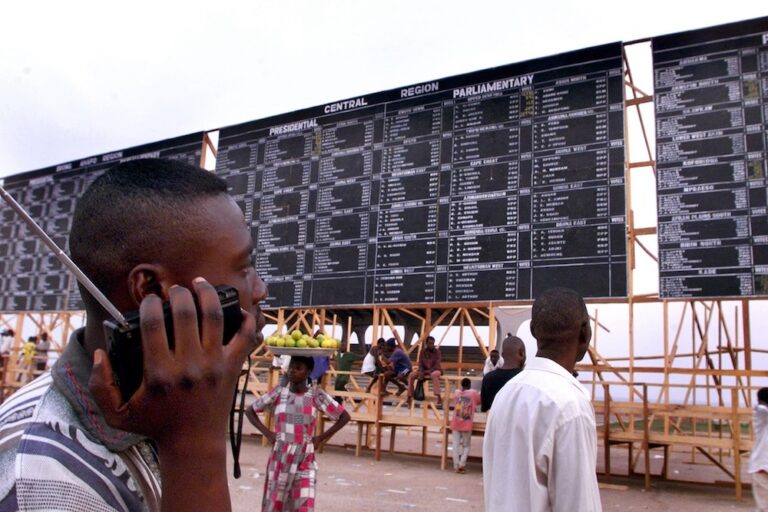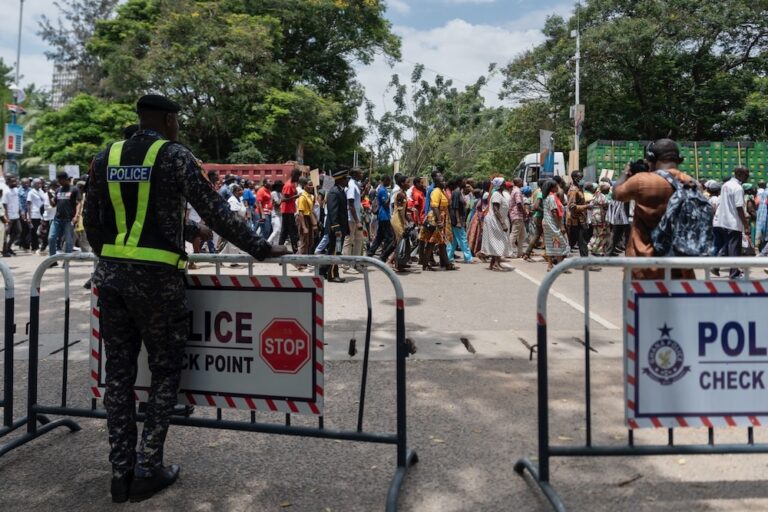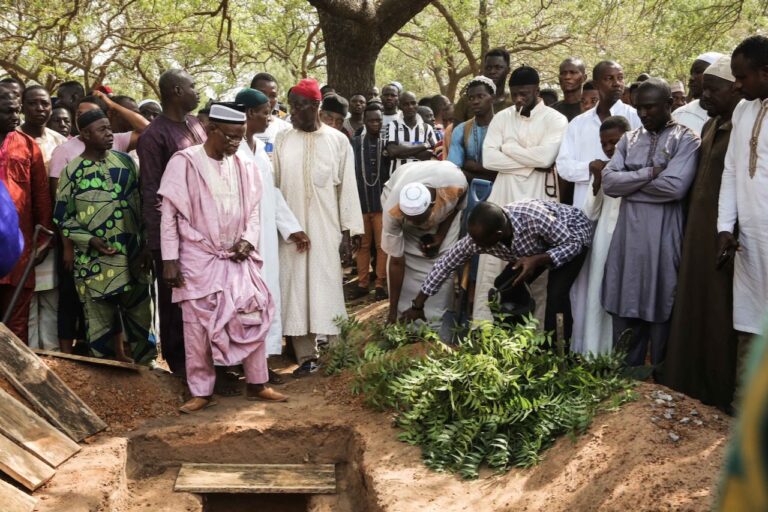Hear how the Media Foundation for West Africa's project is helping those who report on Ebola, and those who rely on that reporting to stay healthy.
Access to information is a term that can often sound very abstract.
But if you dig a little deeper, you will see that this foundational human right can in fact have very tangible effects on people’s everyday lives.
This IFEX podcast is part one of a three part audio series that looks at the critical issue of access to information in Africa. Click here to listen to part two, “The right to information: an IFEX podcast about a game-changing report.” Click here to listen to part three, “An IFEX right-to-information podcast featuring Special Rapporteur Pansy Tlakula.”
In this episode, we speak with Rikke Hansen, a program officer at the Media Foundation for West Africa (MFWA), about her project to promote access to information about Ebola in Ghana.
Hansen tells us about the challenges that many journalists in Ghana encountered when attempting to access information about the deadly virus, and what the MFWA is doing to help ensure that life-saving information reaches people all around the country.
To learn more about the Ebola and Media Project, click here.
We’d love to hear your thoughts on this podcast episode. Feel free to tweet your thoughts to us @IFEX, or share your ideas on our Facebook page.
To learn more about why freedom of information is important, how it is addressed through legislation, and how it can be used to promote accountability and democracy all around the African continent, check out this factsheet by Karen Mohan and Africa Check.
The music in this podcast is entitled “Ceteski,” by NICOCO, and is being used under a Creative Commons License.
Audio Transcript
Caro Rolando: Hi, I’m Caro Rolando, IFEX Section Editor for the regions of Africa, Europe and Central Asia. Welcome to this IFEX podcast. IFEX is the global network of organisations dedicated to defending and promoting free expression. To learn more about our work, visit ifex.org. That’s w-w-w dot i-f-e-x dot o-r-g.
This is part one of a three-part audio series on the critical issue of access to information in Africa. You can check out parts two and three on our website.
Access to information may sound abstract, but the consequences of a lack of information, or of misinformation, can be very real – and very dangerous. In this section, we’ll talk about a project by one of IFEX’s member organisations, the Media Foundation for West Africa. It’s a great example of how improving access to information can directly result in improvements to public health.
Rikke Hansen: This project is making sure that at least if there is a case, then people will know what to do, they’ll know how to recognize the disease, and then we can quickly get it under control.
CR: This is Rikke Hansen.
RH: And I am a program officer at The Media Foundation for West Africa.
CR: Last November, the Media Foundation for West Africa, or MFWA, started an Information Centre on Communicable Diseases under their Media and Ebola Project.
RH: A centre that collates the latest updates on Ebola – such as the number of cases, if there have been any new developments, what the trends are – to keep people informed here in Ghana. And to prevent a potential outbreak.
CR: The idea came about after the MFWA co-organized a training workshop for journalists with support from the World Health Organization and STAR-Ghana to help them report on Ebola.
According to the World Health Organization, there have been over 23,000 cases of Ebola during this latest epidemic in the countries worst hit by the virus — Liberia, Sierra Leone and Guinea. As of February 25th, 2015, these cases have resulted in 9589 deaths.
Part of what caused the Ebola epidemic in West Africa to reach the levels it has, is lack of information, and misinformation.
In 2014 rumours were circulating that didn’t just prevent people from seeking treatment- they made them afraid of the treatment that was actually available.
Last July, in Kenema, Sierra Leone, a mob of people attempted to break into an Ebola Treatment Centre after hearing a rumour that the Ebola virus was invented to provide a cover for “cannibalistic rituals.”
A few months later, a group of journalists and a health team were killed in a village Guinea, while they were conducting an awareness raising campaign. The people who killed them did so because they believed that Ebola was a political lie orchestrated by authorities.
So, clearly, there was a need for more accurate, timely information about Ebola in local media.
In Ghana, there have been no confirmed cases of Ebola. The MFWA and the World Health Organization want to keep it that way.
The MFWA’s workshop brought together journalists from 60 radio stations from all around Ghana. The aim was to equip them with the information and skills to report on the disease in a responsible way, and share important public health information.
RH: During this training, day 1, the journalists, they learned more about like Ebola, the disease. Like, what are the symptoms, what do you do if you see a person with the symptoms. Where do you go to, who do you call, who do you contact. And which preventive measures you should take.
CR: The second day was dedicated to radio. How to find good, credible sources and how – when reporting on Ebola – to avoid causing unnecessary panic. One of the issues that kept coming up was the frustration journalists felt because it was so difficult for them to find basic, reliable information about the disease.
RH: There’s the challenge of the government institutions not giving adequate information here in Ghana. And the health facilities. Which means that there’s no, like, platform for information. So you have to go and pick like all the small pieces of information to make a story.
CR: The journalists also flagged more basic challenges they faced. One was limited and expensive Internet access. According to a study by the International Telecommunication Union, which is a UN agency, by the end of 2012, only 17.1% of Ghanaians used the Internet. Another study, by a group called Research ICT Africa, says that 60% of their respondents found the Internet expensive to use.
RH: When you have to do proper research, you can spend like hours on the Internet. Which can, like be a rather big cost for some of these radio stations.
CR: After the training, Hansen and the MFWA decided to find a way to package clear and accurate information about Ebola and send it to radio journalists across the country. The Ghana Health Service agreed to collaborate. So, under the Ebola and Media Project, they agreed that every time the Health Services received new information, they would send it to the Information Center for Communicable Diseases, managed by the MFWA. The MFWA would then write a story with the new information, and share it with radio journalists. In case you’re wondering why they chose radio, Hansen explains:
RH: In Ghana, there was a recent AfroBarometer study showing that in rural areas 79% of people above 18 get their news, several times a week from radio. That is a very very very very large area of the rural population. And it is, it has proven to be like the main source of information.
CR: Radio is a main source of information in the country, which is why the centre also supported this medium by providing eight local radio stations with digital recorders. So far, Hansen says that the project has been a success. Not only have journalists been better able to report on the issue, but some local stations and media outlets have helped spread the word in their own way. One of the MFWA’s partner stations, AHENFO FM, made a film about Ebola in Twi, a language spoken by an estimated 7 million people in Ghana, and took it on tour.
RH: And then they started touring around the communities in their area. To show them a movie to sensitize them about, again, symptoms, preventive measures, who do you call, and all this basic, basic information.
CR: Hansen believes that when people have access to information, they don’t just become better informed about issues that affect their lives directly — they become more involved, more engaged with the democratic processes that affect their lives
RH: We have seen very clear indications that when more information flows to the citizens, then they also get more responsive.
CR: Hansen’s main take-away from the project?
RH: Just by making sure that the radio stations, they have access to basic information, they, it makes their work so much easier. That they suddenly start thinking of different ways of using this information and getting it out to the people. We have, I think with the 64 radio stations in our Ebola network, we reach the entire Ghana more or less.
CR: Reaching all of Ghana with potentially life-saving information is no small feat, and a project like this can serve as a model for other countries in the region. In the next segment of this three-part series, we’ll hear from another IFEX member organisation that has extensively researched the state of access to information in Africa. We’ll find out why the study was so important, and how it’s being used.
This podcast was produced by Caro Rolando for IFEX, the global network of organisations dedicated to defending and promoting free expression. To hear the rest of this series visit ifex.org. We’d also love to hear your reactions to this series. You can tweet us AT IFEX, or find us on Facebook at IFEXorg.

Professor Kwame Karikari conducts a training session with journalists during the second day of the MFWA’S and the WHO’s workshop in November 2014Media Foundation for West Africa
Caro Rolando is the IFEX Section Editor for Africa, Europe and Central Asia.



